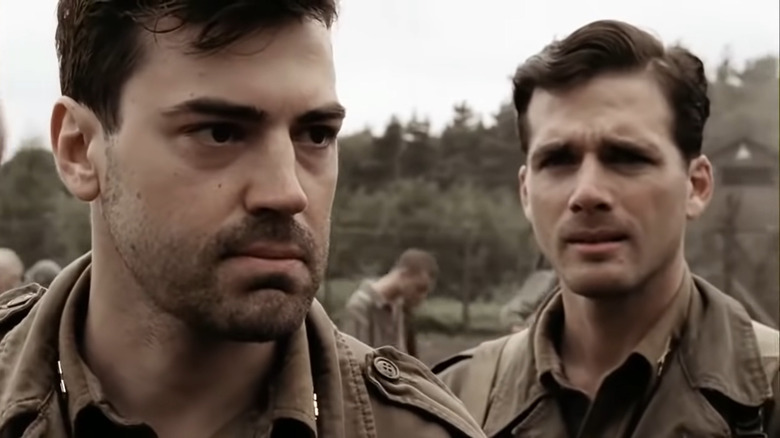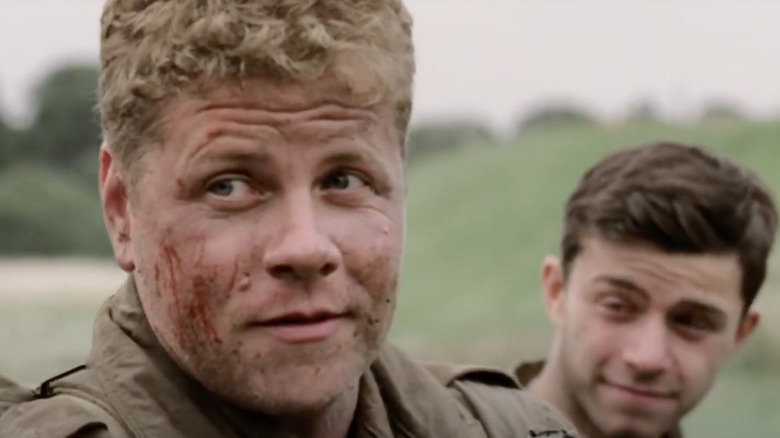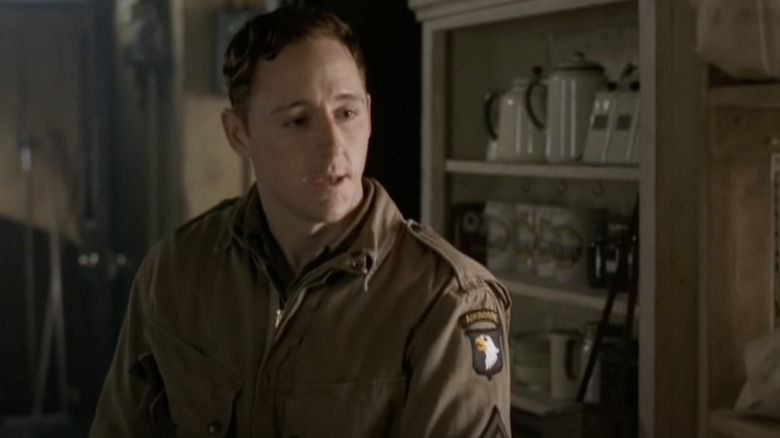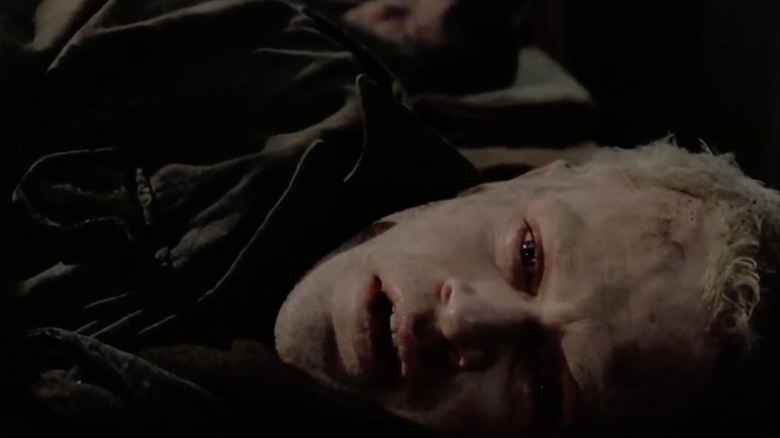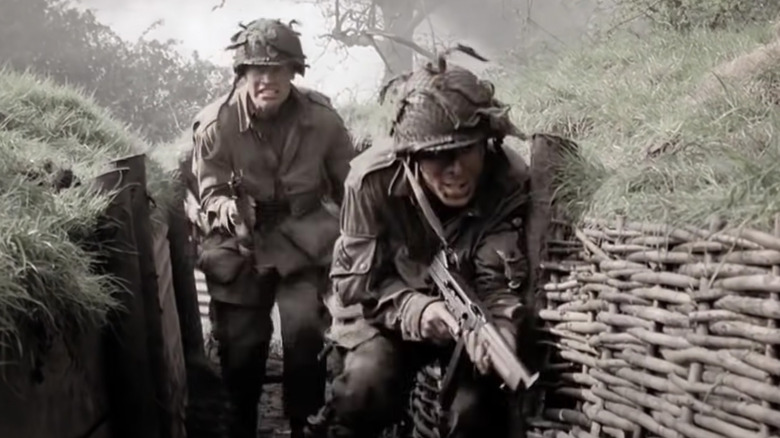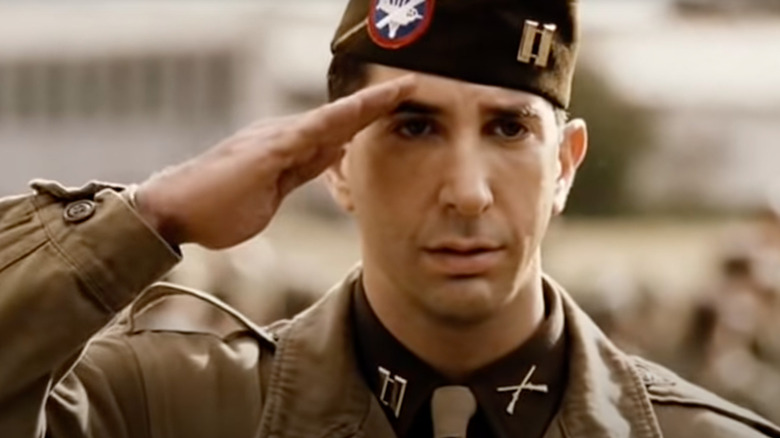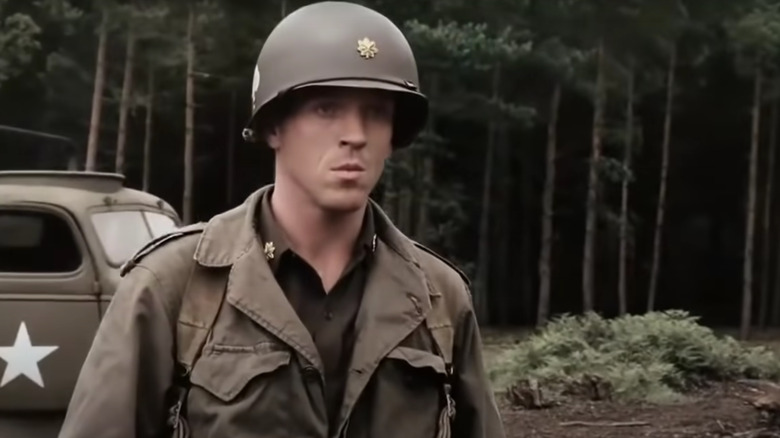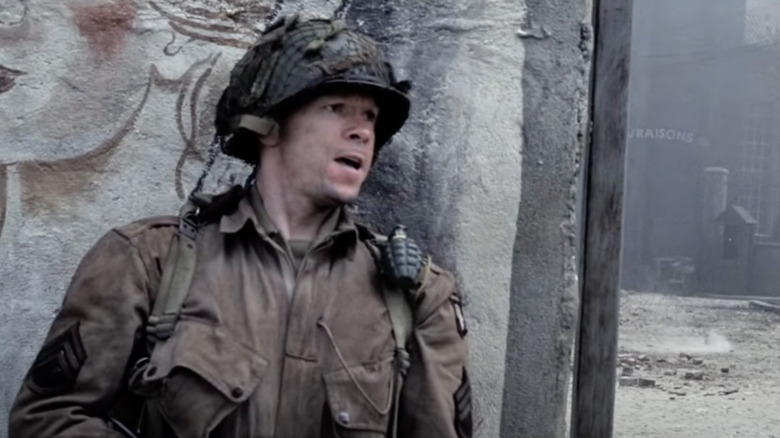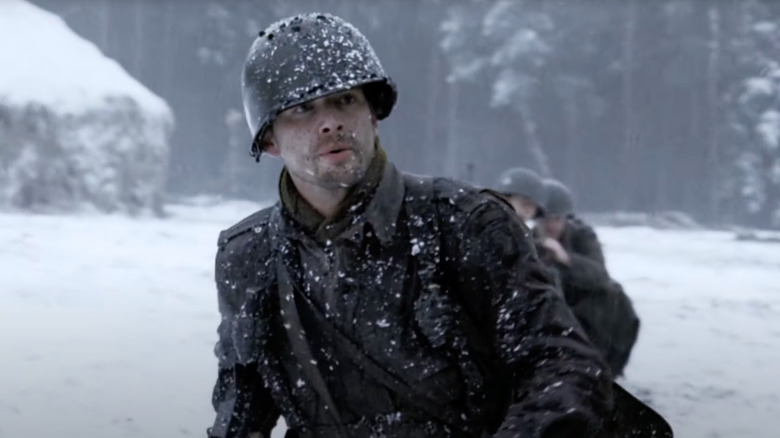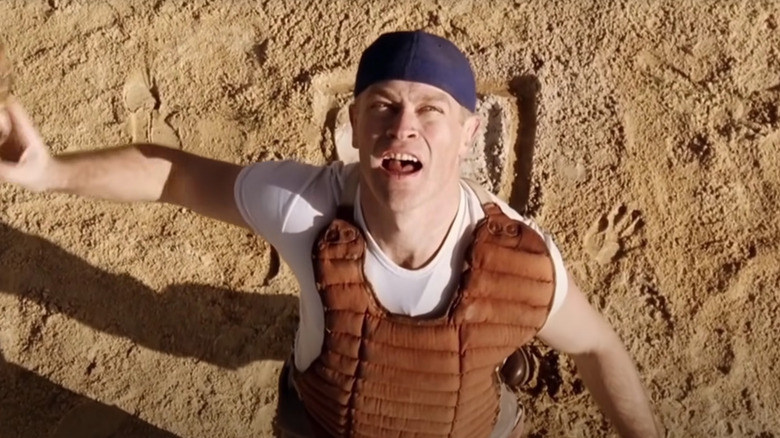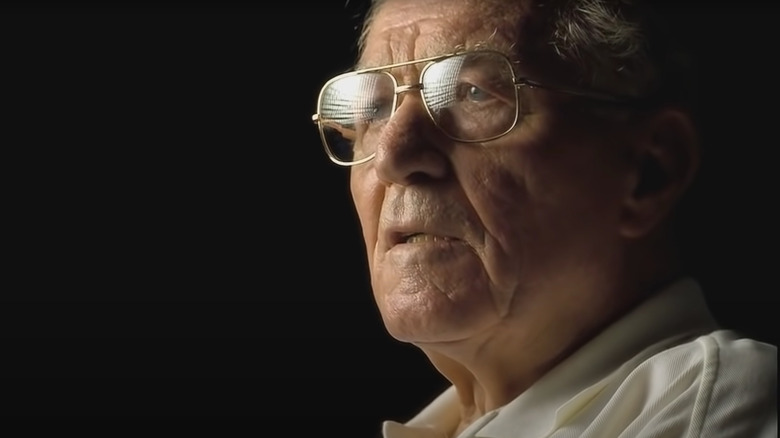The 10 Best Moments In Band Of Brothers
HBO's "Band of Brothers" remains one of the great TV shows and a devastatingly powerful recreation of World War II. Conceived by Steven Spielberg and Tom Hanks shortly after their Academy Award-winning World War II epic "Saving Private Ryan," "Band of Brothers," based on the book by Stephen E. Ambrose, chronicles "Easy" Company, 2nd Battalion, 506th Parachute Infantry Regiment of the 101st Airborne Division's experiences in Europe. We follow this ragtag group of Americans through boot camp, D-Day, and Bastogne; witness their most ferocious battles; and watch as the war emotionally and physically impacts each of them.
As a bonus, preceding each episode is an introduction from various real-life members of Easy Company. They describe the action in their own words so that it resonates deeper. It's one thing to watch these events and another to hear a veteran recall the experience first-hand.
Starring Damian Lewis, Ron Livingston, Neal McDonough, Donnie Wahlberg, Richard Speight, Jr., Kirk Acevedo, Scott Grimes, Michael Cudiltz, and David Schwimmer, among others, "Band of Brothers" is a sensational television event that will open your eyes to the true horrors of war. I rewatch the 10-part miniseries at least once a year and jumped at the opportunity to share my ten favorite moments from this fantastic show. Check out the list below to see my selections ranked from good to great. Then, do yourself a favor. Watch (or rewatch) "Band of Brothers," and follow up that experience with "The Pacific."
Bull rides alone
In the fourth episode, "Replacements," Denver "Bull" Randleman (Michael Cudlitz) is wounded in the shoulder and separated from his crew following an intense battle during Operation Market-Garden. Hiding in a sewer, Bull evades German soldiers and sneaks into a barn under cover of darkness, bumping into a Dutch father and daughter, who help remove the shrapnel from his shoulder. Bull then fends off a nosy German soldier and, after allowing the father and daughter to flee, waits for sunrise and eventually meets up with Easy Company.
The reunion is short but sweet — a small victory amidst a failed operation to end the war by Christmas 1944. "I don't know whether to slap you, kiss you, or salute you," Bill Guarnere smirks. Bull salutes the small team assembled to search for him, prompting the soft-spoken soldier to state: "I never did like this company none."
In reality, this sequence played out much differently. According to Stephen E. Ambrose's book, Randleman "got hit in the shoulder and cut off from his squad. He ducked into a barn. A German soldier came running in behind him. Randleman bayoneted the man, killed him, and covered his body with hay. Then he covered himself up with hay and hid out."
No matter. While a bit exaggerated, Bull's solo outing and subsequent reunion rank among the best scenes in the series.
Malarkey picks up laundry
At the end of Episode 3, "Carentan," Sgt. Donald Malarkey (Scott Grimes) heads into town to pick up his laundry from a woman named Mrs. Lamb. After collecting his belongings — two shirts and two pairs of trousers — and paying the fee, Malarkey leaves. However, before the young soldier can exit the locale, Mrs. Lamb stops him and asks if he can pick up the laundry for Lt. Meehan (Jason O'Mara). Malarkey's face drops. Meehan died on D-Day. "I'll take it," Malarkey says solemnly. Then, Mrs. Lamb asks if he can take the laundry of other soldiers who had likewise fallen during combat. A title card informs us that Easy Company lost 65 men by the time they pulled off the line on June 29.
According to Malarkey's son, the dramatic scene never occurred: "No that didn't happen, that was Hollywood as my dad would say! He would of [sic] totally done it, if the opportunity presented itself," Michael explained in a Reddit Q&A. Regardless, the moment offers a bitter reminder of the lives lost during World War II.
Buck Compton taps out
Lynn "Buck" Compton (Neal McDonough) experienced plenty of hardships during his time in the war. From landing without equipment on D-Day to getting shot in the buttocks (a recurring motif among Easy Company), Compton takes a beating but remains one of the more likable officers in the series. However, every man has his breaking point, and Buck's arrives in the frigid wilderness of Bastogne. Following endless days of freezing in foxholes without food, water, or supplies, Compton and his men are struck by German shelling. The barrage wounds Bill Guarnere and Joseph Toye, a display of violence that proves too much for Buck. In one of the most heartbreaking scenes of the series, we see the character drop his helmet while looking at the mangled corpses of his friends.
In reality, Buck broke down and sobbed after losing so many men and was subsequently pulled from the line and sent to a hospital, where he recovered from frostbite.
"It's a terrible thing to see your guys like that," Buck said after the war. "Death was everywhere."
Luckily, on the show, we see Buck regroup with Easy Company for a game of baseball at the war's conclusion — a happy ending to a terrible tale.
Attack on the artillery
After a relatively quiet first episode, "Band of Brothers" jumps straight into the action with "Day of Days" and focuses on the Normandy invasion in devastating detail. We follow Easy Company as they leap from their planes into a sky riddled with explosions and enemy fire. Then, we watch as higher-ups such as Lt. Winters piece together squads out of the scattered soldiers across the countryside. Eventually, Winters has enough men from Easy Company to assault several German 88s firing on Utah beach. The team divides into groups. Winters leads the main attack, and the others take out the Germans hiding in the trenches along with a nearby machine gun nest.
There are several notable occurrences in this stunning sequence. We see our first Easy Company soldier, Robert "Popeye" Wynn, take a bullet in the buttocks, Staff Sgt. Joseph Toye survives a grenade blast unscathed (twice!) and uses a pair of brass knuckles to knock out a German, Donald Malarky risks his life in pursuit of a Luger pistol, Ronald Speirs goes on his first maniacal run, and we see Winters' incredible knack for combat. Winters' assault on Brécourt Manor was so impressive that he earned the Distinguished Service Cross. The United States Military Academy at West Point teaches its students about Easy Company's capture of the German Battery to this day.
Captain Sobel salutes Winters
Easy Company hits the ground running following their arrival at Bootcamp, where their field officer, Herbert Sobel (David Schwimmer), made their lives a living Hell. He pushes our boys to their absolute limit, forcing them to run long marathons, including a three-mile run around Currahee Mountain, and demonstrates little patience for ineptitude, right down to his company's uniforms. Sobel lived up to his nickname, "the devil in jump boots," but also molded Easy Company into an incredible unit. Dick Winters even noted, "One of the reasons that Easy Company excelled was undoubtedly Captain Sobel."
Unfortunately, while Sobel excelled at drill instruction, several deficiencies prevented him from emerging as a leader. For starters, he could not read maps or improvise in the heat of combat. Moreover, he never bonded with his men, which made following his orders difficult. Eventually, Easy Company's non-commissioned officers, including Winters, surrendered their stripes (under penalty of death) and demanded that Sobel step down from his command. Naturally, Colonel Robert Sink (Dale Dye) sends Sobel elsewhere and places Winters in charge of Easy Company.
Later, in Episode 10, "Points," Winters, now a major, bumps into Capt. Sobel, who tries to slip past his former pupil. "Captain Sobel," Winters shouts. "We salute the rank, not the man." Sobel reluctantly salutes his superior officer — a stand-off that actually happened — resulting in one of the show's most crowd-pleasing moments.
Easy Company liberates a concentration camp
Episode 9, "Why We Fight," follows Lewis Nixon during Easy Company's discovery of a concentration camp outside Landsberg, Germany. Nixon is in a foul mood as he tries to understand the point of the war and why he survived despite never firing his weapon. It doesn't help that he was recently involved in a mission that claimed the lives of several soldiers. "At least it wasn't me," he growls.
Later, Nixon searches for booze in a lavish mansion owned by a wealthy German family and discovers the owner is a high-ranking Nazi officer. After a brief run-in with the lady of the house, who silently admonishes the soldier for his actions, Nixon lowers his head and exits the home.
In the next scene, a platoon happens upon a concentration camp filled with malnourished prisoners. Nixon arrives with the rest of Easy Company, witnesses the horror for himself, and later notices the wife of the German officer burying Jewish corpses. They share a look, and shame pours all over her face.
The episode is difficult to watch but is a stark reminder of the horrors of war.
The Battle of Carentan
After landing in Normandy, Easy Company quickly goes to work. Their objective: capture the town of Carentan, "the only place where armor from Omaha and Utah beach can link up and head inland," according to Lt. Welsh (Rick Warden). What follows is an astonishing set piece that depicts the violent battle with the same gritty realism as "Saving Private Ryan." Machine guns erupt from all angles, buildings explode, and casualties quickly mount. After a dogged struggle, Easy Company secures the locale but must dig in and withstand a vicious counterattack replete with mortars, tanks, and an endless swarm of German soldiers. The episode ends with a scene in which Malarkey picks up leftover laundry, and we learn about the enormous loss of life inflicted on Easy Company.
As directed by Mikael Salomon, the episode, just the third in the series, packs a wallop. The action is fierce, the stakes real. But, ultimately, it's one of the most intense entries in the entire series and an awesome, if not horrific, depiction of combat.
Lt. Speirs charges the Germans
The most thrilling "Band of Brothers" moment is hard to believe, but it happened. Following their frigid holdup in Bastogne, Easy Company, led by Lt. Dike, turns its sights on German-occupied Foy. At first, Dike's instincts are right on, but for one reason or another, the commander rallies his men around some haystacks and freezes. Winters, watching from a nearby hill, screams for his men to press onward — to no avail. A German sniper picks them off one by one. All hope is lost.
Eventually, Winters summons Speirs and orders him to take control of the situation. Speirs immediately charges into battle, relieves Dike of his command, directs Easy Company to their positions, and relaunches the assault. Moments later, Speirs learns that "I" Company is cut off from the rest of the group with no radio. Incredibly, Speirs charges through a field of German soldiers too perplexed at his actions to open fire.
"The astounding thing was," Carwood Lipton (Donnie Wahlberg) says, "that after he hooked up with 'I' Company, he came back."
Speirs' quick thinking saved countless lives and won the battle. This sequence gives me goosebumps every time.
Final baseball game
After 10 episodes of bloody combat in hazardous environments, it's fitting that "Band of Brothers" ends with a baseball game blanketed with warm sunlight. This scene serves as the emotional gut punch, as we watch our survivors enjoy a brief moment of well-deserved recreation and are reminded of the men Easy Company lost along the way. We also learn the fates of many members who lived long, fulfilling lives, including Buck Compton, who survived his bout with frostbite and returned to Easy Company for a spell.
Ultimately, the final baseball scene concludes "Band of Brothers" on a high note that is sure to leave a tear in your eye and a smile on your face. The sequence is also interesting in how it helps us truly get to know these soldiers more personally. Sure, we followed them around for 10 hours, but we only learned a little about their personal lives outside of a few short lines. We realize that these men had lives before and after the war and endured the same struggles we face on a day-to-day basis. It is a fascinating revelation that leaves you longing for a follow-up series chronicling the postwar life of Dick Winters, who eventually found "a little peaceful corner of the world."
Winters reads a letter
The most heart-wrenching moment in all of "Band of Brothers," and perhaps its finest scene, occurs when the real Dick Winters recalls the final letter written to him by Mike Ranney, who earned a Bronze Star for his efforts during World War II. "Do you remember the letter that Mike Ranney wrote me?" Winters asks an offscreen interviewer. "You do? Do you remember how he ended it?" With a deep breath and a glance upward, light reflecting off his glasses, Winters then recites the passage from memory: "I cherish the memories of a question my grandson asked me the other day, when he said, 'Grandpa, were you a hero in the war?' Grandpa said, 'No ... but I served in a company of heroes.'"
For all the violence and chaos recreated in stunning detail for the series, this brief, quiet moment of a wise older man tearfully recalling a letter from his war buddy captures the intricacies of World War II best. It's the scene that always hits me hardest and a fitting end to a perfect show.
